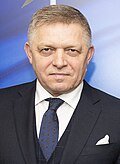Fico's Third Cabinet | |
|---|---|
 9th Cabinet of Slovakia | |
 Fico in 2016 | |
| Date formed | 23 March 2016 |
| Date dissolved | 22 March 2018 |
| People and organisations | |
| Head of state | Andrej Kiska |
| Head of government | Robert Fico |
| No. of ministers | 15 |
| Member parties | Direction – Social Democracy Slovak National Party Most–Híd Network |
| Status in legislature | Coalition government |
| Opposition parties | Freedom and Solidarity Ordinary People Kotleba – People's Party Our Slovakia We Are Family |
| Opposition leader | Richard Sulík |
| History | |
| Election | 2016 Slovak parliamentary election |
| Predecessor | Fico's Second Cabinet |
| Successor | Pellegrini's Cabinet |
| ||
|---|---|---|
Political Parties
| ||
Robert Fico's Third Cabinet was the government of Slovakia, headed by Prime Minister Robert Fico.
